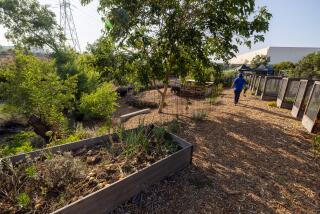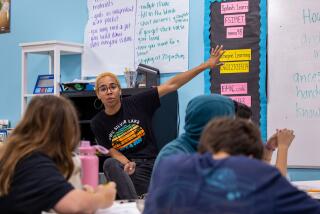Science Teachers Experimenting With Socratic Dialogue
- Share via
In the traditional science classroom, a teacher would probably introduce the topic of the environment by lecturing for a while, then assign a few pages of text for silent reading unless a few students felt sufficiently stirred to ask a question or two.
In Dennis Gray’s science classroom, the teacher rearranges the desks in a circle and recites the “Pledge to the Planet Earth” as a way to stimulate discussion:
“I pledge allegiance to the Earth, and to the flora, fauna and human life that it supports, one planet, indivisible, with safe air, water and soil, justice, equal rights and peace for all.”
Students would then talk with each other about what the statement means, guided by occasional questions or assertions from their teacher, all intended to have children think and apply what they learn, rather than simply taking in facts and figures to be regurgitated later on a multiple-choice test.
A group of science instructors from the Sweetwater secondary school district in South Bay took up Gray on his ideas this past week, willing to learn how to apply his “Socratic Seminars” to their plans for revamping secondary-level science teaching beginning in the fall. Although the seminars are catching on in some social studies and English offerings around the county, they have not been thought by most educators as relevant to science instruction.
So the teachers found themselves the first couple of days sitting as students while Gray--a consultant on Socratic-style teaching for San Diego city schools--and his associate, Rona Wilensky, led a seminar on competing views of evolution.
The teachers, all veterans of years of science teaching, had been asked to read contrasting passages from Stephen Jay Gould, a strong proponent of the theory of evolution, and Duane Gish, a leading intellectual defender of creationism.
They wrestled with the opening question, “How does each man know what he claims to know?” as if students in their own classrooms: a few teachers volunteered some tentative thoughts, while others fidgeted with their papers and prayed they would not be called on to contribute.
All in the group quickly learned that there is no way to “wing it” during a seminar, that preparation both on the part of the student and teacher is critical. The ability to lead, to turn the discussion in mid-phase if necessary, to refrain from posing prepared questions if students take off on an interesting tangent--all of that was practiced during three days of intensive workshops.
“I remember one time I was leading a seminar and I didn’t really understand the material,” Gray said. “So I said, ‘Let’s take another tack, let’s pick the paragraphs that seem to be key, or those that are so confusing that we can’t make a judgement on, and do a (study) on them.’. . . Later we reported on each graph and then continued the seminar.”
The importance of pushing students to think, and not just come up with a predetermined answer, was illustrated by the teachers themselves when they took over to run their own mini-seminars using the “Pledge to the Planet Earth.”
One group seized on the message in the pledge and dived into a complex argument over how an individual could best carry it out.
“To me, it means don’t take out more from mother Earth than you really need,” George Varga, a science teacher at National City Junior High School, said.
“So does that mean you’ll agree to act in a certain way, even toward plants?” countered Lourdes Hemstead from Hilltop High School.
“Well, this can be interpreted differently by different people,” conceded Varga. And so it continued, with questions of animal experimentation for medicine, of rain-forest protection for countries like Brazil that want economic growth instead and of growth in San Diego County, where water is more and more a precious commodity.
A second group of teachers took a different approach to the same pledge, however.
They debated in which order to rank the elements of the pledge. Would human life take prominence in their hierarchy, or should the concept of “indivisible” assume primacy?
“I’d say equal rights, in that man has no more right to exist than other creatures,” ventured Carol Bornhorst of Bonita Vista Junior High.
“Do you give equal rights to flora and fauna as well?” questioned Dirk Harman of Hilltop High.
The group circled around issues of human beings as parasites on the Earth, of whether animals and plants are on Earth for the benefit of man, of whether natural evolution and extinction play as great a role in biological change as intentional acts of man.
Gray stressed the diversity of the thinking process in explaining to the teachers how to assess student performance at the end of a grading period, or semester.
“You ask the students individually what they think the themes running through the discussions have been, not looking for a single right answer but for what they have seen and what they are able to discuss,” Gray said. “What you want them to do is practice thinking, to show that they understand ideas better, that they speak better, that they read better.”
Varga, an admitted skeptic about the Socratic idea in science when the workshop started, said, “It would be silly to give a 50-question true-and-false test to follow something like this. . . . But I can see where implementation of this could be difficult with some teachers.”
Joanne Carson of Castle Park Middle School said the workshops had given her enough confidence to try seminars to improve her students’ grasp of concepts.
“We have been so tied to PGOs, (educator jargon for programs, goals and objectives) and to have students perform for tests that we’ve never felt at liberty to say, ‘Gee, if you guys didn’t get this lesson, OK, here is a different way to consider this and to learn how to think’ rather than than just presenting it the same way again and having (the students) regurgitate it.”
The teachers hope to begin using Socratic seminars in September as part of an effort to improve Sweetwater’s science curriculum.
Numerous studies, ranging from those of the National Science Foundation to the American Assn. for the Advancement of Science, have castigated secondary-school science teaching for a lack of innovation, a failure to ground enough students in fundamental skills and an inability to make topics interesting enough so that students will consider science-based careers.
In particular, these major institutions cite statistics showing that too few non-white students are prepared for science careers. That concern hits home especially in a district like Sweetwater, where more than three-fourths of its 28,000 students are non-white.
“We know that present teaching styles and techniques are not working as well as they should, that didactic teaching just doesn’t always work, that we can’t just lecture like we learned to do in the past,” said Sweetwater teacher Tom Davis. Davis helped the district prepare a successful $500,000 federal grant request, in conjunction with the teacher education program at UC Irvine, to prepare a new curriculum using technology and new instructional methods.
Students will approach science thematically, Davis said. A tentative seventh-grade curriculum calls for them to explore the universe, then move into concepts in the atmosphere, followed by study of the hydrosphere (water) and biosphere, with classes broken into cooperative problem-solving groups at times, brought together into computer-aided lectures at times, and placed in Socratic dialogues at times.
“We see the Socratic dialogue as a way to introduce ideas and concepts, and then follow up with demonstrations, readings, writings of science logs, etc.,” Davis said. In other cases, a seminar could follow a lab exercise, and students would talk about what they observed.
Bornhorst found herself not wanting to stop the dialogues during the workshops, when Gray called for a halt to move on to other matters.
“It’s fascinating the way we can integrate these discussions into the entire subject” of science, she said.
More to Read
Sign up for Essential California
The most important California stories and recommendations in your inbox every morning.
You may occasionally receive promotional content from the Los Angeles Times.










